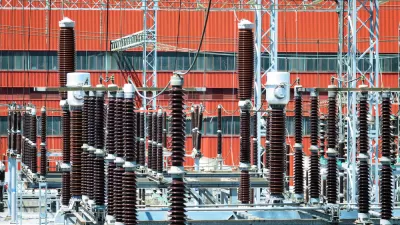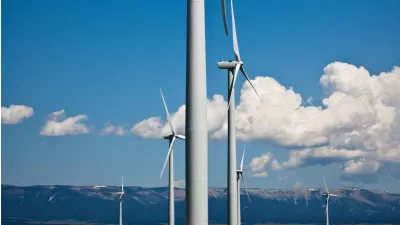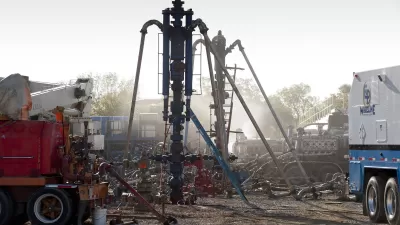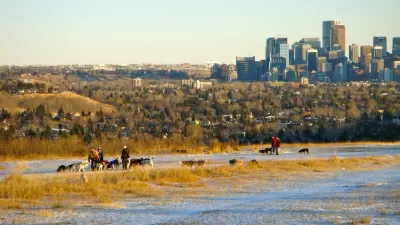Energy

Costa Rica Off Fossil Fuels for 75 Days and Counting
Kudos are in order for the Central American nation of Costa Rica. We suspect running your country without burning fossil fuels is its own reward, however.
First-Ever Federal Fracking Rules Issued by Interior Department
Despite only applying to Federal lands where a small amount of fracking takes place, energy companies are strongly opposed, perhaps fearing that states without fracking rules could adopt them, which is one of the goals of the Interior Department.

Texas Town to Flip the Switch—100 Percent Renewable Energy
Georgetown, located north of Austin and home to 54,000 Texans, will soon be a part of the future, by running completely on renewable energy.
Report: 2014 Carbon Emissions Down as World's Economy Grows
A recent report offers optimism that will world is making progress in the right direction to reduce carbon emissions.
Where Have All the Oil Trains in California Gone?
While many California were protesting oil trains carrying the hazardous Bakken crude, a funny thing happened—they stopped coming. While protests may have delayed the construction of new oil terminals, economics is at the root of the slowdown.
Wyoming to Finance Out-of-State Coal Ports
The state of Wyoming sees more potential than risk in financing coal industry infrastructure projects in the state of Washington.
Who Will Win the Carbon Neutral Economy?
The fossil fuel industry has convinced the public that aggressive carbon reduction will harm the economy. Au contraire. The carbon reduction leader will secure its place at the top of the global economy, argues UrbDeZine Editor Bill Adams.
Business, Government, and Infrastructure in Brazil
With one of the fastest growing economies in the world, Brazil is at the cusp of major change. Arup's Gustavo Ferreria discusses the role that public-private partnerships are playing in modernizing and expanding the country's infrastructure systems.
Crude-by-Rail's New Workhorse No Better than the Old Workhorse
The new oil tank cars were supposed to be key to preventing the fiery explosions associated with oil-train derailments. However, four recent explosions since Feb. 14, with two occurring last Thursday and Saturday, all involved the new tankers.

New York Towns Consider Secession, Cite Fracking Ban
Concerned about their economic fate, several upstate New York towns have expressed interest in joining Pennsylvania instead.
Cause of Crude-by-Rail Explosions Identified
The Wall Street Journal's senior energy reporter, Russell Gold, is interviewed on NPR about the February 16 derailment and explosion in West Virginia of an oil-train hauling 109 tanker cars of Bakken crude from North Dakota.
Below Average Snowpack Sparks Drought Concerns in Washington State
It might be hard to believe if you're in Boston right now, but the entire West Coast is suffering a poorly timed dearth of snow, a critical source of drinking water and hydroelectric capacity for the region.
California Turns Toward the Sea for Drought Relief
The Wall Street Journal examines desalination efforts on the Central and South Coasts, starting with the reactivation of a Santa Barbara plant. Notwithstanding criticisms on costs and environmental damage, eight plants have been built since 2006.
Another California First: the End of the Carbon Externality for Motorists
California's cap-and-trade market saw its largest carbon sale, $1.02 billion, thanks to millions of motorists now paying about a dime a gallon for the right to emit carbon for the first time since the program began in November 2012.

Oil Town Feels the Pinch
The rise of shale oil in Alberta over the past decade has made Calgary one of the most vibrant cities on the continent. But with oil slumping around $50 per barrel, the fortunes of an industry town look less rosy.
The End of the Keystone XL Pipeline Saga?
Within hours of receiving the bipartisan bill on Tuesday to authorize the Keystone XL pipeline, President Obama made good on his promise to veto it. The legislation would have short-circuited the approval process, which upset the president.
Canada to Hold Shippers, Railways Fully Accountable for Oil-Train Derailments
Since the July 2013 derailment and explosion of an oil train in Lac-Mégantic, Quebec* killed 47, Canada has contributed C$155 million toward the rebuilding effort because the railroad's insurance was insufficient.
Mining the City
Rapid urbanization and climate change will make it harder for cities to provide crucial resources for their citizens. In this article, Arup consultants Amy Leitch and Laura Frost examine how the built environment can fill this emerging need.
The Far-Reaching, Lasting Effects of Low Oil Prices
With SUV sales up, car sales down, and mileage driven up, the effects of lower gas prices could soon extend to land use, making suburban and exurban commuting more affordable. Economists have a term for these effects: demand response.
Can the Growing Risk of Human-Made Earthquakes Be Managed?
A new study aims to broaden the understanding of an increasing number of human-caused earthquakes. Fracking might not be entirely to blame.
Pagination
Urban Design for Planners 1: Software Tools
This six-course series explores essential urban design concepts using open source software and equips planners with the tools they need to participate fully in the urban design process.
Planning for Universal Design
Learn the tools for implementing Universal Design in planning regulations.
Ada County Highway District
Clanton & Associates, Inc.
Jessamine County Fiscal Court
Institute for Housing and Urban Development Studies (IHS)
City of Grandview
Harvard GSD Executive Education
Toledo-Lucas County Plan Commissions
Salt Lake City
NYU Wagner Graduate School of Public Service


































